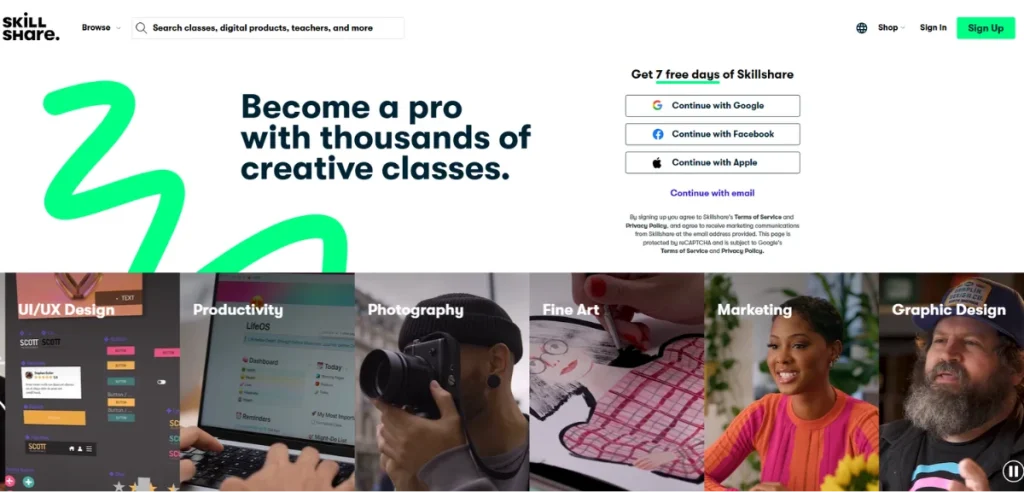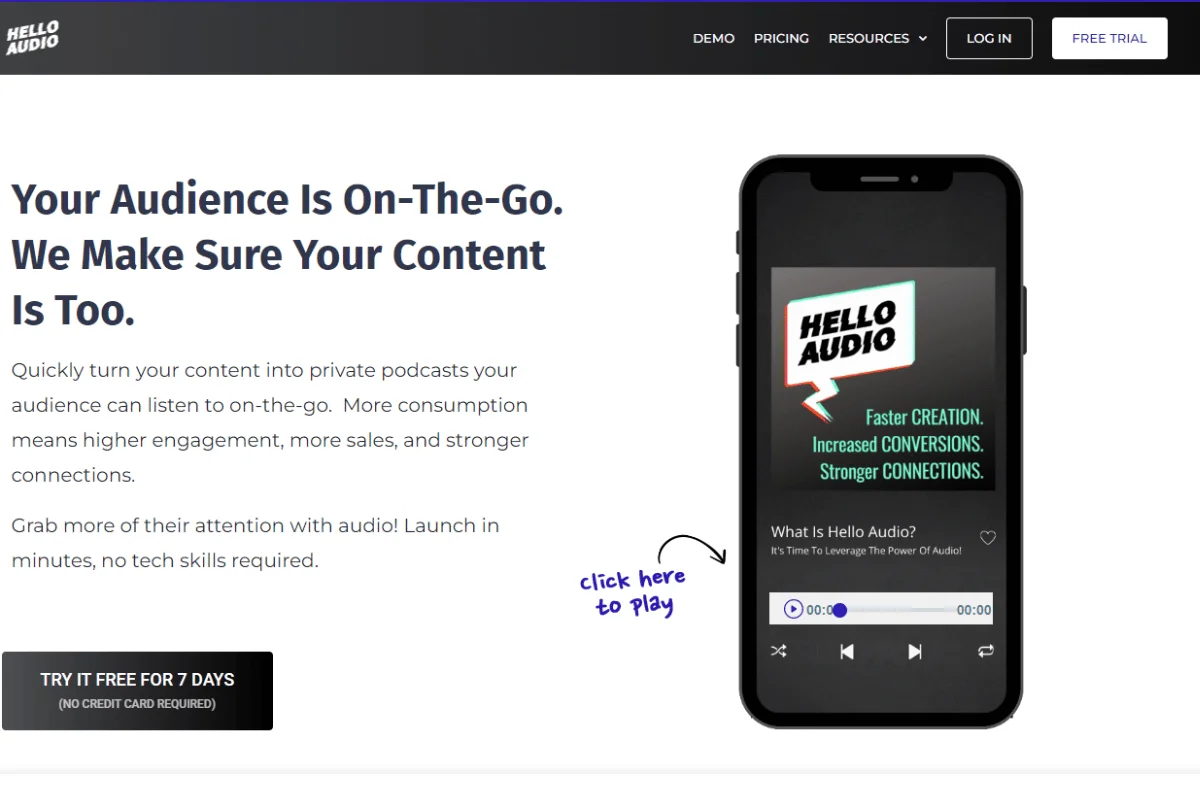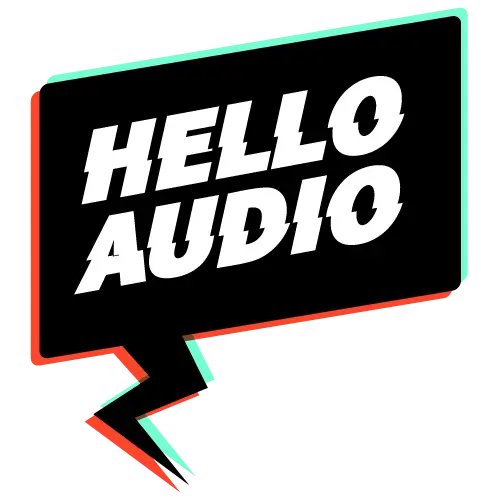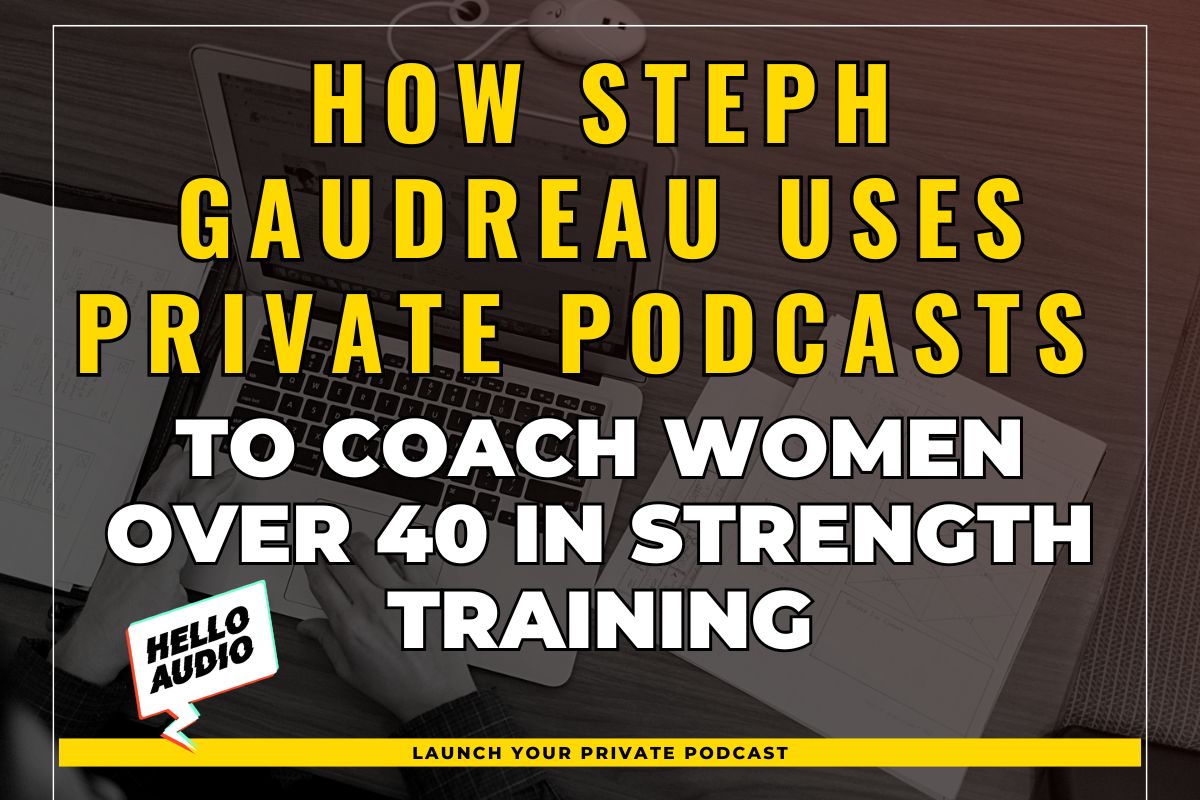Creating and sharing courses has opened new doors for creators. With the rise of e-learning platforms, you can reach students worldwide, expand your brand, and earn income by teaching what you’re passionate about.
Skillshare is one of those platforms that lets all types of creators add a diverse range of courses, from design and photography to entrepreneurship and writing.
Though it’s a popular choice for many, it’s not your only option for sharing courses. In this article, we’ll share some Skillshare alternatives that meet your goals and preferences as a creator.
TL;DR – Best Alternatives to Skillshare
After doing our research, we’ve compiled a list of top alternatives to Skillshare. We’ll dig deeper into the details of each top pick later on.
- Hello Audio
- Teachable
- Udemy
- Coursera
- LinkedIn Learning
- Thinkific
- Domestika
- Pluralsight
- MasterClass
- Brilliant
- CreativeLive
- Khan Academy
Looking to quickly convert your existing courses into private feeds?
With Hello Audio’s easy-to-use platform, we let you repurpose your content into private podcasts — all done in minutes. Plus, you can choose which students can access which set of courses. Sign up today to see how effortlessly you can transform your content!

What is Skillshare?
Skillshare is an e-learning platform with 25,000+ online courses, mostly focused on creative classes for both neophytes and pros. This means your content targets a wide audience.
The topics on the platform revolve around photography, design, illustration, and writing.
Skillshare offers the flexibility to design brief, project-based classes, making it easy to create engaging lessons without long, dull lectures.
How Much Does Skillshare Cost?
Before you launch your content on Skillshare, you must sign up as a Skillshare teacher and gain approval from their team.
If you’ve done so successfully, you can publish your courses without any cost.

Advantages of Skillshare
If you’re an entrepreneur, artist, creator, or freelancer looking to monetize your skills, here are the benefits you’ll gain from Skillshare:
- Easy Onboarding: You can onboard easily and for free by using the resources on the Teacher Hub.
- Variety of Categories: You can explore a variety of niches that you thrive in, whether it’s painting, drawing, graphic design, creative writing, social media marketing, or photography.
- Built-in Audience: Skillshare claims to attract over 42 million enrollments, so you don’t need to build your community.
- Earn Passive Income from Your Expertise: As a creator, you get paid monthly through royalties based on the time students watch your courses, which can create a long-term income for you.
- Allows You to Grow Your Brand: You can build trust with your students, build an email list, and expand your reach beyond Skillshare.

Major Cons of Skillshare
Although Skillshare offers a vast selection of courses, there are a few drawbacks to consider. Here are some of them:
- Content Quality: Since anyone can create a course, a mix of beginner and advanced content is published without a strict vetting process.
- Lack of Certification: There is no opportunity to award students certificates for course completion. This limits the appeal for learners who may choose other platforms that offer these certificates.
- Earnings Based on Watch Time: Skillshare pays creators based on the watch time of their content, which can sometimes be unpredictable.

Features That Make a Skillshare Alternative Worth It
The features that make other alternative options great for teachers include:
- Flexible Monetization: On Skillshare, you’re paid with royalties, depending on your students’ watch time.
In platforms like Teachable and Podia, you can control your earnings. You can set your own prices, run one-time payments, subscriptions, or bundles.
- Access to Your Audience Data: Skillshare doesn’t give you access to your students’ emails, analytics, or real feedback. That makes it harder to grow an email list or build a community.
With Thinkific or Kajabi, you have complete ownership of your users’ data. You can connect with students directly, build an email list, and nurture an online community.
- Multiple Content Formats: Video-only teaching is limiting.
Alternatives like Hello Audio open up more options by letting you create audio courses, while others support PDFs, quizzes, or even live sessions. This flexibility makes it easier to meet your audience where they are.
- Recognized Certification: Skillshare certificates are not widely accepted.
Alternatives like Coursera, LinkedIn Learning, and Pluralsight are great if you want to offer widely recognized certificates.
- Community: You must keep students engaged beyond the lessons.
Teachable and Thinkific give you tools to build discussion groups or knowledge support hubs, while Hello Audio helps you nurture a private, tight-knit community.
- Scalability: With Skillshare, you cannot scale into a full-on digital business.
Alternatives like Teachable, Thinkific, and Hello Audio let you expand into coaching, memberships, podcasts, or any other direction you choose for your teaching business.

Our 12 Skillshare Alternative Picks
If Skillshare doesn’t suit your needs as a creator, you have several alternatives to choose from. We’ll discuss each one below:
1. Hello Audio
As an alternative to Skillshare, Hello Audio shines as our top choice because it emphasizes hosting audio content, in contrast to Skillshare’s focus on video-based creative courses.
Hello Audio lets you easily repurpose content with private podcasts delivered on top podcast platforms like Apple Podcasts, Google Podcasts, and Overcast. This helps you reach your audience anytime and anywhere.
Thanks to its intuitive user interface, anyone, regardless of technical skill, can easily use our platform. Launching podcasts quickly shouldn’t be an issue because it only takes minutes.

2. Teachable vs. Skillshare
Teachable can be a worthwhile substitute for Skillshare, specifically for entrepreneurs. Published content consists of pre-recorded videos and text resources. However, there are options for live classes.
Besides that, the user experience is simple, making the platform easy to use even for the less tech-savvy. Teachable also offers dedicated sales pages for your products and courses, so no web hosting service is needed.
3. Skillshare vs. Udemy
An advantage that Udemy has over Skillshare is its language support. Udemy offers courses to learners in 75 languages, compared to Skillshare’s five available languages.
Its simple platform allows learners to rate your courses, giving you a needed boost among Udemy’s 210,000+ courses.
Creators also have several content options when using Udemy, including videos, quizzes, audio lectures, and more.
4. Skillshare vs. Coursera
The Silicon Valley-based learning platform Coursera partners with top universities worldwide to create more than 7,000 courses in several disciplines, including business, data science, humanities, personal development, and more.
Because of its partnership with these universities, Coursera offers a platform that follows a more traditional learning style.
Also, creating courses is made easy with its AI-assisted course builder that develops tailored content for learners.

5. Skillshare vs. LinkedIn Learning
While both are capable learning platforms, LinkedIn Learning focuses more on career-oriented topics.
LinkedIn Learning follows a vetting process to ensure that only experts can create courses, making them more consistent and of good quality.
Like Coursera, LinkedIn Learning has partnered with top global universities. This partnership is useful if you want to reach students seeking formal credentials.
6. Thinkific vs. Skillshare
Course creators and students alike can consider Thinkific as an alternative to Skillshare. It’s one of the few platforms that offers a free plan, making it more accessible to users.
Course creators can use the Course Builder to create content that gives their brand a distinct identity, though this feature is unavailable in the free plan.
Reviews have also highlighted Thinkific’s top-notch customer service, with prompt support via mobile or email.
7. Domestika vs. Skillshare
If you’re a creator looking to teach skills in various creative disciplines, Domestika is a wise Skillshare alternative.
With one of the largest online communities for creatives, Domestika offers a high-visibility yet niche platform for creators to teach skills like painting, illustration, or design.
The platform emphasizes high-quality production, helping you present your lessons in a more polished manner.
8. Skillshare vs. Pluralsight
Choosing Pluralsight as an alternative to Skillshare can be a smart decision for creators specializing in technical subjects like software development, data science, and IT.
Before you teach on Pluralsight, you must undergo an audition, during which the team evaluates whether you are a good fit.
The main benefit of creating on Pluralsight is that their team supports you at every step of the creation process, from blueprinting to reviewing.
The Pluralsight team also works around your schedule to ensure you create high-quality content at a pace that works for you.

9. Skillshare vs. MasterClass
Another worthy Skillshare alternative making it to our list is MasterClass. It offers classes to students of different levels and lets you create content for any topic, be it film or science.
Think big names in their respective industries, like James Cameron for film or Gordon Ramsay for culinary. Hence, you must already have an existing following to create on their platform.
This makes MasterClass the most exclusive option on our list since their team must handpick you.
Creating content can increase your credibility because it’s considered a prestigious platform.
10. Brilliant vs. Skillshare
While Skillshare offers other offerings besides science and technology, Brilliant focuses specifically on STEM disciplines, such as math, data, and computer science.
You can create quizzes, which users can take between courses to refresh their knowledge on the topic discussed.
Because Brilliant centers on STEM fields, your assessments must focus on problem-solving.
If you prefer teaching students with more interactive learning, then Brilliant might be the platform for you.
11. CreativeLive vs. Skillshare
Despite what the name suggests, CreativeLive isn’t limited to offering lessons on creative disciplines. It covers a wide range of topics, including art, design, marketing, entrepreneurship, and more.
What makes CreativeLive unique is the live class feature, where students can ask questions, and you can answer them on the spot.
This significantly boosts learner engagement, making it a valuable option for creators who prefer direct interaction with their communities. Skillshare, on the other hand, strongly focuses on pre-recorded content.
12. Skillshare vs. Khan Academy
A learning platform that initially started as a YouTube channel, Khan Academy is a fast-growing platform that teaches K-12 and early college students.
With Khan Academy, you can teach foundational concepts in different areas of STEM, giving students a detailed, step-by-step learning experience.
The platform is ideal for simplifying complex concepts with structured and academic-focused content, whereas Skillshare offers more creative freedom and flexibility for engaging with your audience.

Factors to Consider Before Switching Platforms
A new platform can offer new opportunities, but you have to weigh the pros and cons carefully. If you’re considering alternatives to Skillshare, take note of the following factors before switching:
- Cost: Compare subscription plans, transaction fees, or hidden costs before making the switch.
- Features: Evaluate the tools found in the new platform. For instance, it may have customizable templates or mobile optimization.
- Subject Matter: Some platforms are geared toward a specific discipline. Take note of what industry or niche the platform caters to.
- Customer Feedback: Read up on what other users have to say about their experience with the platform to better weigh the advantages and disadvantages.

How to Move to Sites Like Skillshare Without Losing Audience
If you’re thinking of migrating your courses to websites similar to Skillshare, here are the steps to follow to avoid losing your audience:
1. Start Building an Email List
Skillshare doesn’t allow you to export your students’ emails, but it will enable you to link your website and social media profile links in your teacher bio.
So, connect with your students off the platform by sharing links to your YouTube channel, LinkedIn, or Instagram.
2. Create a Low-Ticket Offer on the New Platform
You can create a mini-course or a lead magnet on the new platform.
You could then offer it as a free downloadable resource, bonus content, or free access content inside your classes, as exclusive bonuses. Use tools like ConvertKit or Substack to build an email list.
3. Repackage Your Skillshare Content
You don’t have to invent anything from scratch. Instead, turn your Skillshare videos into podcast courses through a platform – Hello Audio. You can also turn it into a flagship course in Thinkific or Teachable.
For instance, Lisa Delugo used Hello Audio to enhance her coaching courses into private podcasts.
4. Nurture Your New Audience
Gradually nurture your new audience with exciting and bonus content to build trust before introducing them to paid offers. You can also create an online community space where your students can connect and stay engaged.
Also, track your podcast metrics to keep improving your content.

Level Up Your Course Creation With Private Podcasts – Try Hello Audio
Hello Audio simplifies the process of creating on-the-go learning experiences through private podcasts, making it a perfect addition for course creators looking to strengthen audience engagement.
Here are the major benefits of this process:
- Easy Setup: Get started without technical hurdles; the user-friendly interface allows seamless content creation.
- Simple Content Conversion: Easily transform existing content into private podcasts without complex tools.
- Broad Distribution Process: Deliver your content via major platforms like Spotify and Apple Podcasts, ensuring accessibility.
- Stronger Connection: Build stronger bonds with your audience through a more personal medium.
Level up your course creation and sign up for a free trial with Hello Audio!

Frequently Asked Questions (FAQs)
In this section, we’ll tackle the most frequently asked questions about Skillshare and its alternatives:
How to Cancel Skillshare
If you’re looking to cancel your Skillshare membership, simply follow these steps:
- Log into your Skillshare account and access your settings.
- Select Memberships and Payment.
- Click Cancel Membership.
- Follow the succeeding steps. You can only access Skillshare’s content until the paid period has elapsed.
Which Skillshare Alternatives Offer Offline Learning Options?
Most of the alternatives on our list offer offline learning options, whether downloaded on a desktop or the mobile app.
Some of the apps that offer this option include Udemy, Masterclass, and Coursera.
Which Skillshare Alternatives Have Better Mobile App Support?
While most platforms on our list offer mobile apps, not all are created equal.
Hello Audio, for instance, provides a smooth mobile app experience for users. You can easily record and publish audio content from your phone.
Do Skillshare Alternatives Offer Lifetime Access to Courses?
Yes, some platforms offer lifetime access. Udemy, for example, offers lifetime access to free courses provided that their platform still holds the license to the course.
Can I Transfer My Existing Skillshare Courses to Another Platform?
Yes, you can transfer your existing Skillshare courses to other tools, but there is no automatic export function. You will have to take these steps:
- Download all your video assets.
- Edit to suit your new platform’s formats.
- Reupload your courses to your new platform.
Do Skillshare Alternatives Offer Better Marketing Tools?
Skillshare alternatives like Teachable, Podia, and Thinkific allow you to build email automation, custom landing pages, and integrate with sales funnels using third-party tools like Zapier.
With these alternatives, you’re building an actual business while teaching. Skillshare doesn’t let you own that process.
Conclusion
Skillshare may be an excellent platform for exploring new topics and sharing content, but it’s not without its limitations.
If you’re considering other platforms, consider their costs, features, product reviews, and subject expertise.
Hello Audio is the go-to platform for creators who want to increase audience engagement and generate more sales. Sign up today to start offering exclusive content with private podcasts!












